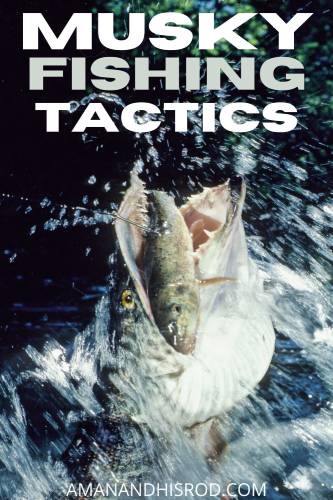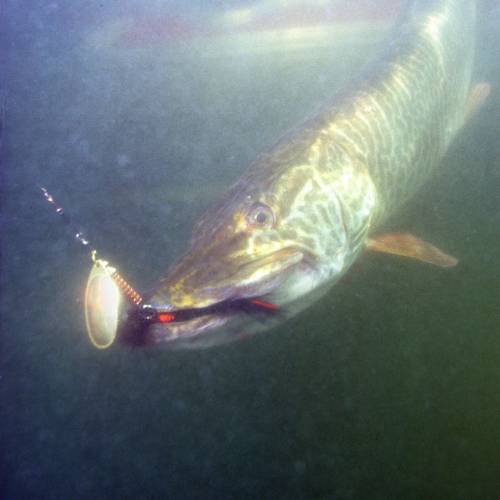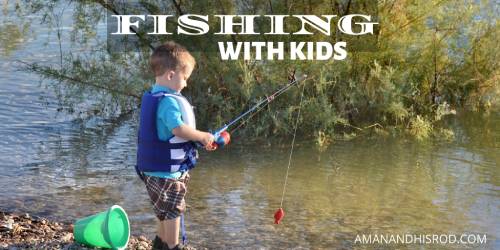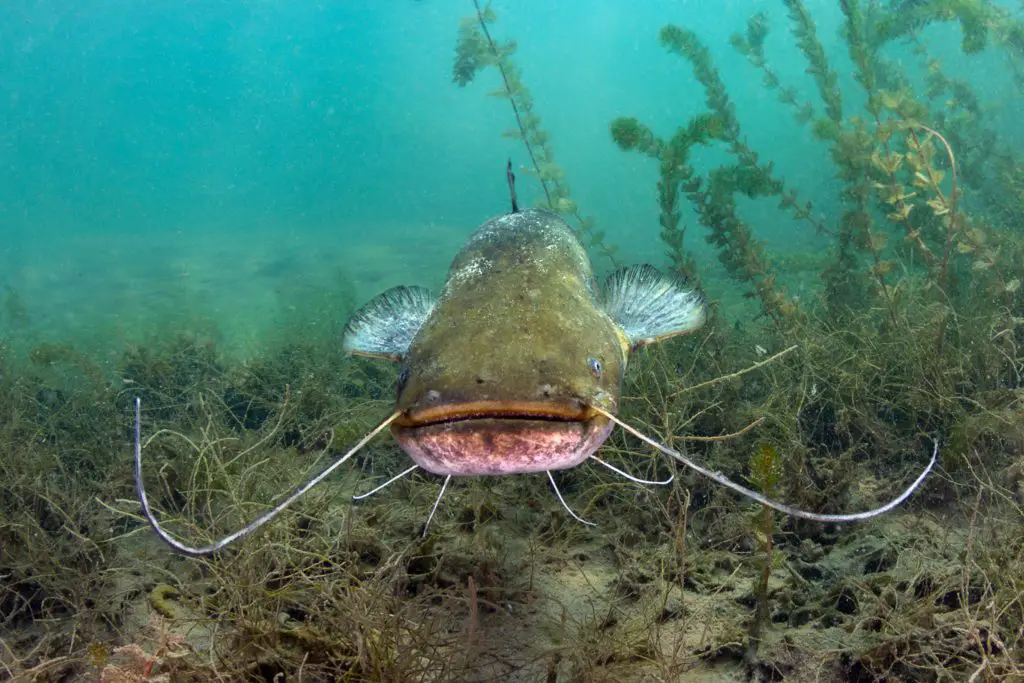Out of all freshwater fish in North America, muskies are the most difficult to catch for the average angler. Musky fishing takes hardcore dedication to be successful. There is a reason they are called the fish of 10,000 casts, because thats the amount of fishing it takes the average angler to catch one in much of the waters they inhabit.
While it may seem daunting, it’s by no means impossible. In this article we will get you started with some tips and tricks on how to catch musky.
This website is reader supported. Any purchases you make through links on this site earn us a commission at no additional cost to you. Thank you for your support!
To Catch a Musky, You must know Muskies
Muskies are found naturally throughout the upper Midwest and Canada.
There are populations in certain bodies of water as far south as Tennessee and even in places like South Carolina and West Virginia, due to artificial stocking.
The farther south you go from the northern regions of the U.S. the more rare the bodies of water with muskies inhabiting them become.
Be sure the waters you plan on fishing have a healthy population of muskies in them.
To Catch a Musky, You have to Know Where They Are!
Being an apex predator, muskies are a very low density fish. In your standard body of water you’re looking for a fish with a density of one fish or less per acre of water.
That might not sound like a challenge, but there isn’t going to be one fish on every acre, due to location preferences of the fish.
On a large lake of say 3000 acres, this leaves newcomers a lot of questioning in terms of fish location.
Removing dead parts of water with very few muskies in it is crucial on any lake you’re fishing, once you narrow down where the fish frequent, you will contact them on a more consistent basis.
This is a key element in how to catch musky. Don’t forget to eleminate dead water.
Musky Fishing in Spring

Musky locations change depending on the time of year, in the Spring they can be located in shallow bays, creek mouths and channels with good weed growth, these are areas where they spawn and feed.
Summer Musky Fishing
Once spring turns into summer fish tend to push deeper as waters warm. At this time they can be found in a wide array of areas.
Weed lines and drop offs are the easiest places to fish as a beginner, but other areas range from mid lake humps, points, rock piles, timber, or even suspended in the middle of the basin feeding on schools of roaming baitfish.
Fishing for Fall Musky
As the water temperature stall falling along with the leaves, fish can still be found around areas such as drop offs, humps or points, especially if there is still healthy green weeds, but normally the fish will push out into deeper water and structure, while they may not be on the same spots they were in the summer, they may still be nearby, out in the deep water adjacent to these spots, position your boat deeper, so your lures aren’t necessarily casting on the spots, but instead the deeper water outside of it.
Musky Fishing Takes Time
Muskies definitely have preferential feeding times. One of the most obvious times is sunrise and sunset, like most other fish species, but there are other times to consider fishing for muskies.
Night fishing can be an awesome time to pursue muskies, but this tactic is dependent on the body of water, some lakes have a great night bite, some don’t.
Great indicators of a potentially amazing night fishing lake can be things like clear water, deep water, and heavy midday boat traffic, especially on the weekends.
Boat traffic can cause fish to go deep during daylight hours and instead feed primarily at night.
Another factor that should never be overlooked is the moon, Moonrise and moonset have been proven to be amazingly effective for catching muskies, sometimes even more than sunrise and sunset, and due to the time of moonrise and moonset changing daily, you might want to be on your best spot at noon, when everyone else has stopped fishing for the day.
Best Tools for the Job

Musky fishing requires specialized gear to not only be effective with your presentations, but to stand up to the rigors of throwing very large lures, and fighting very large fish.
Rods for Catching Musky
Musky rods tend to be pretty large when compared to fishing for a species like bass or walleye.
Most rods should be 8 to 9 feet in length and come in strengths from medium heavy to XX heavy.
Depending on the types and sizes of lures you’re using, longer rods also help during figure eights with large fish, allowing you bigger sweeping turns than smaller rods, and increasing the percentage of caught fish boatside.
For jerkbait presentations, many anglers still stick to rods that are heavy power and around 7’6” in length.
The St. Croix Triumph Graphite Musky Fishing Rod is a very nice rod for musy at a reasonable price.
St. Croix Triumph Graphite Musky Fishing Rod
Reels for Catching Musky
Reels are purpose built pieces of equipment and some are easier to use in certain presentations than others.
For lures like jerkbaits and gilders, a higher speed gear ratio is crucial for reeling up slack line in between jerks or rod pumps quickly, and can be great for topwater lures and twitching crankbaits as well.
When it comes to lures like large double bladed bucktails and big soft plastic presentations, large spool reels with a lot of winching power will help keep you less fatigued while fishing for the day.
Something like the Daiwa LEXA-WN400PWR-P Lexa Type WN Casting Reel is a great choice for musky lures. It has the abitlity to do everything mentioned above.
Daiwa LEXA-WN400PWR-P Lexa Type WN Casting Reel
Musky Terminal Tackle
In terms of line, super braids are a must in musky angling, musky anglers tend to go overpowered on their lines, simply because it helps in multiple areas in terms of abrasion resistance, reefing baits and fish out of heavy cover, and shock from massive hook sets.
For these reasons 80 to 100 pound test braided line is the standard in most cases.
For leaders, very heavy fluorocarbon and monofilament have really become the standard, don’t skimp on these in terms of components such as swivels and clips.
Straight wire leaders are exceptional when running lures like “walk the dog” style Topwater, Jerkbaits and glide baits.
Lures for Musky Fishing
Musky fishing has a very dedicated industry for lures, and most companies building musky lures are dedicated to only making musky lures.
One lure you can never be without when figuring out how to catch musky are bucktails. Bucktails have been responsible for catching more muskies than any other type of lure.
Mepps BM HO-BO MuskyKiller-Bucktail
Along with bucktails, there are a wide variety of dive and rise jerkbaits like the famous Suick and Glide baits like Phantoms.
These lure are more for precision fishing small spots that you know muskies frequent, while bucktails are great search baits that allow you to cover water quickly.
Along with bucktails, topwater lures and trolling crankbaits are also great lures to cover water quickly, and help you dial in where the fish are located.
Large Soft plastic lures have really taken musky fishing by storm in the last 15 to 20 years and for good reason.
They present a more lifelike feel to muskies of prey moving in the water and can at times outshine all other types of lures.
like the Musky Innovations Bulldawg, and Chaos Tackle Medussa can really put the hurt on muskies, particularly in deeper water or in the fall, but can be used year round.
Soft plastic lures also can be found in very large sizes, up to 16 inches in length and weighing in at a pound.
Conclusion
While learning how to catch musky may seem intimidating or daunting for newcomers, they aren’t impossible to catch, and there is no substitute for time on the water.
Experience trumps all, while reading informational articles are helpful and expand your knowledge, nothing will expand your knowledge more than simply spending time on the water.
The more you explore a body of water, the more fish you contact. The more you mind will internalize that data and help you contact and catch fish on a regular basis.
It takes decades to become an expert musky angler, and even then you will never truly have the fish figured out, and that’s why hardcore musky anglers have a reputation that has set them apart from other anglers on the same lakes and rivers they fish.




